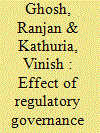| Srl | Item |
| 1 |
ID:
150771


|
|
|
|
|
| Summary/Abstract |
This paper investigates the impact of institutional quality – typified as regulatory governance – on the performance of thermal power plants in India. The Indian power sector was reformed in the early 1990s. However, reforms are effective only as much as the regulators are committed in ensuring that they are implemented. We hypothesize that higher the quality of regulation in a federal Indian state, higher is the efficiency of electric generation utilities. A translog stochastic frontier model is estimated using index of state-level independent regulation as one of the determinants of inefficiency. The dataset comprises a panel of 77 coal-based thermal power plants during the reform period covering over 70% of installed electricity generation capacity. The mean technical efficiency of 76.7% indicates there is wide scope for efficiency improvement in the sector. Results are robust to various model specifications and show that state-level regulators have positively impacted plant performance. Technical efficiency is sensitive to both unbundling of state utilities, and regulatory experience. The policy implication is that further reforms which empower independent regulators will have far reaching impacts on power sector performance.
|
|
|
|
|
|
|
|
|
|
|
|
|
|
|
|
| 2 |
ID:
109446


|
|
|
|
|
| Publication |
2011.
|
| Summary/Abstract |
Turkey has been going through a liberalization process in its electricity market over the last decade. So far, the regulatory content of the market reforms has been in the center of attention in the literature, to the negligence of regulatory governance. However, recent studies, which applied the theoretical insights of new institutional economics to utilities regulation, have demonstrated that political endowments of the country draw the boundaries to which extent such regulatory content can be effectively implemented. In line with these studies, this paper adopts an institutional approach and attempts to identify the political endowments of Turkey in order to further analyze whether the market reforms succeeded in bringing about sufficient checks to cure the institutional problems. In other words, the paper takes a picture of the overall regulatory arena. The results show that the current regulatory structure, especially government-regulator relations, yet fails to meet good regulatory governance criteria. The paper also provides some policy suggestions.
|
|
|
|
|
|
|
|
|
|
|
|
|
|
|
|
| 3 |
ID:
139563


|
|
|
|
|
| Summary/Abstract |
Both supply- and demand-oriented solutions are important in cleaning up the electricity sector. However, their successful deployment calls for the removal of various barriers. This paper looks at China's electricity industry, one of the world's largest emitters of greenhouse gases, by relating the regulatory framework to the environmental dimension of sustainable electricity development. It develops an analytical framework by drawing upon the literature on the deployment of supply- and demand-side solutions, regulatory governance, and environmental policy integration. The paper finds that, in China's electricity sector, environmental considerations are subordinate to economic and development goals in policymaking and enforcement. Under the current regulatory framework, regulatory policies/instruments are not conducive to removing barriers to the effective deployment of the solutions.
|
|
|
|
|
|
|
|
|
|
|
|
|
|
|
|